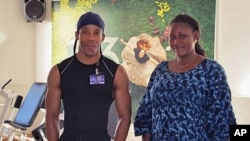Losing weight is a common goal across much of the Western world. In developing countries, a majority of people still struggle to meet daily food needs. But in many African cities this trend is changing as obesity rates are rising, a result of more sedentary lifestyles and easier access to high-fat foods. Attitudes in Senegal, for instance, are changing about weight issues and fitness.
Curves is Dakar’s only exclusively female fitness center. Just a few years ago this type of gym may easily have gone bankrupt for lack of clientele. But today, on any given morning, the room is packed with women from 22 to 70 years old who are pushing, twisting and jumping their way to better health. A majority of them are overweight or fighting obesity.
Aissatou Sidime is a 27-year-old Guinean student who lives in Dakar. A year ago she decided it was time to get in shape and has been regularly exercising at least three times a week.
Growing emphasis on health
Aissatou said she decided to come primarily for physical reasons. She was too big, and needed something to do because she always felt tired. When you are young, she said, girls are more concerned about losing weight to be beautiful. But as they get older, and especially once married, most women are just trying to lose all the weight they put on after having children.
The World Health Organization says there are an estimated 1 billion overweight people and 300 million obese adults worldwide. This is more than double the rate it was 30 years ago.
In the United States and parts of Europe, recent studies have shown a leveling off of obesity rates among both adults and children. But in many developing regions, including Africa, this is simply not the case.
The World Health Organization says obesity-related problems threaten about 115 million people in developing countries, and some researchers believe that by 2025, three quarters of the world’s obese population will be in developing countries.
Fighting obesity
In South Africa, more than half the female population is considered obese or overweight, and there are growing obesity problems in countries like Ghana and Lesotho.
Biological anthropologist Enguerran Macia conducted the first study on obesity, and overweight men and women in Dakar.
Obesity is measured through a Body Mass Index, or BMI, which divides a person’s weight in kilograms by their height in square meters. A number over 25 is considered overweight and over 30 obese.
Macia said that while they found almost no women in Dakar between the ages of 20 and 25 who are obese, by 50 years old more than half of them are due to changes in the body due to age, marriage, pregnancy and lower activity.
Macia noted that the more education a woman has, the less likely she is to be obese. That's the same as in Western countries. He said Dakar is transforming from a traditional society, in which people once needed to show their wealth through weight, to a modern society where people show their wealth through weight control.
Learning to work out
Curves fitness trainer Mickael Lafarge has been working as a coach for the past 12 years. Lafarge said that even during the time he has been working as a fitness trainer, he has noticed a change in concepts of beauty. He said before, women always thought "bigger was better." Now those same women, however, are having health problems. So now the trend is to be thin, because most men want slimmer women.
But traditionally in Senegal, as in many other parts of West Africa, both men and women have valued a more voluptuous woman, even to the detriment of her health. Yet obesity can bring on a slew of chronic health problems, from hypertension and diabetes, to heart problems and arthritis.
Macia said that one who is obese is five times more susceptible to hypertension, and that the poor may be the next group to suffer.
Macia said poor people are not the ones exercising. And they also have little choice but to take advantage of the cheap, high-fat foods that are available. Macia predicted the weight increase eventually will trickle down to the poor, because they are the ones not aware of the health problems and risks associated with weight gain.
While much of the Sahel region is preparing for yet another looming food crisis, with an expected 11 million people to be affected by food insecurity, discussing issues of obesity and overweight often are overlooked. In Senegal, more than half the population still does not eat the recommended number of calories every day, and a vast majority of these people live in the rural areas.
According to Macia, though, this “double-burden” of overweight and underweight people living in the same country has to be addressed sooner or later. Macia said that in Dakar this means that illnesses like diabetes and hypertension now co-exist with endemic illnesses like malaria. He said it places too much burden on a country without the means to handle it.
As part of a local initiative to help women fight obesity and get in shape, one of Senegal’s national TV stations, 2STV, is starting a weekday morning exercise program expected to launch this week.




